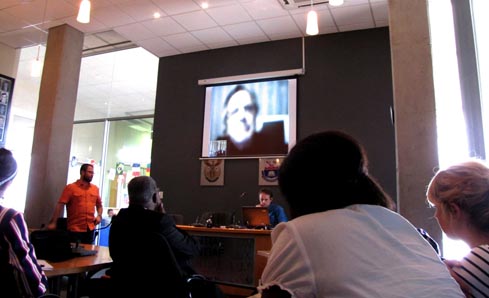 |
|
Direct conversation between the UFS and the South African ambassador to Japan
Photo: Gerda-Marie Viviers
|
During a direct conversation with the South African ambassador to Japan, Mr Gert Grobler, today, the University of the Free State (UFS) expressed its compassion and solidarity with the people of Japan. The university also stated that it intended to support the country and its citizens in various ways.
This came after Japan was plunged into chaos the past week as a result of various earthquakes and consequential disasters. Mr Grobler, who participated in the conversation via Skype from Tokyo, welcomed this talk initiative initiated by Mr Rudi Buys, Dean: Student Affairs, and the Interim Student Committee (ISC). The talks formed part of a series of initiatives launched by students to promote solidarity with Japan, and which includes fund-raising projects and awareness campaigns.
Mr Grobler expressed his appreciation for the initiative: “The initiative by the UFS is greatly appreciated, and I shall do anything to promote partnerships between the UFS and Japan, particularly in collaboration with the ambassador for Japan in South Africa. The solidarity project is essential, because this is the worst crisis Japan has ever experienced in its history.”
In solidarity with Japan, the Student Committee envisages a mass march on Thursday, 17 March 2011 by means of which students will declare their unanimity with Japan and their support of human rights.
Prof. Jonathan Jansen, UFS Vice-Chancellor and Rector, also promised to send a message of support directly to the Japanese embassy in Pretoria, as well as extending a hand of support to Japanese universities in order to become part of discussions on how to render assistance, while making plans for students to visit the respective countries and share their experiences first-hand.
Mr Buys informed the ambassador that the university would support the rescue teams, which are departing for Japan in response to a request by Mr Grobler, by means of manpower. In response to this, Mr Grobler, a Kovsie alumnus, welcomed this token of compassion and offer of assistance. “I am excited to see that South Africa cares so much for Japan.”
Media Release
15 March 2011
Issued by: Lacea Loader
Director: Strategic Communication
Tel: 051 401 2584
Cell: 083 645 2454
E-mail: news@ufs.ac.za